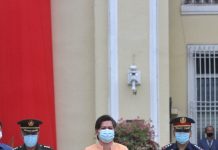Sugar traders in Davao City are urging the government to give the sugar industry a respite by temporarily exempting the commodity from the 12-percent Value Added Tax (VAT) imposed per sack of sugar.
“The best solution the government can resort to is to remove the 12-percent Value Added Tax on sugar,” said Johnny Loyola of SRSO Basic Commodities, a rice and sugar wholesaler based in Davao City.
Loyola said with the prevailing P2,400 per sack of sugar today, the 12-percent VAT translates to P288, which could lower the price of sugar to only P2,112 per sack.
By removing the VAT for sugar on a temporary basis, he said, the price of sugar will go down and retailers will be able to sell sugar at a lesser price.
Refined sugar prices have sky-rocketed from P38.00 per kilo last year to almost P52 per kilo at present, prompting the government to request the Philippine Sugar Millers Association to provide 150,000 kilos of sugar to poor consumers through the National Food Authority outlets.
“But even that cannot alter or influence the price of sugar in the market,” Loyola said.
He added that 150,000 kilos of sugar is only about 3,000 sacks which is not even enough for Metro Manila’s demand.
Loyola said if it is true that the association will sell the sugar at $ 46 dollars to P48 then they are giving that away at a loss. And after that appropriation has been sold out, what happens next, he asked?
Majority or about 60 percent of the country’s sugar supply comes from Negros, he noted, and farmers’ associations are bidding out their produce to sugar traders and industrial users.
The highest price wins the bid, he added, and that price is carried on and applied throughout the country, even in Mindanao.
“Our sugar prices here in Davao are actually influenced by the outcome of the bidding in Negros. This remains true, despite the fact that there are four main sources of sugar in the Philippines–two in Bukidnon and one each in Cotabato and Davao,” he said.
Loyola said there is no need to import sugar since it will just entail a government subsidy of about P2 million. The government is planning to import 60,000 tons of sugar by April and an additional 90,000 tons by June this year.
Loyola, however, said Davao consumers should not worry about sugar supply for the city as there is sufficient supply of sugar for Mindanao.
“We have enough production to meet the demand but we have to contend with the high prices of sugar,” he added.
Provincial Agricultural Statistics Officer Gualberto Lobo said there is a total sugarcane production (canepoints) of 502,649.23 between the November 2008 to July 2009 cropping season.
He said this is the total production out of a total of 10,210 hectares planted to sugarcane in the province.
National Food Authority XI Assistant for Operations Elaine Respecia said they have not received directive of any kind from the main office about the supposed rice importation and if the city will be given a share in the importation.
Lobo said the increasing price of sugar is caused by supply and demand.
He said industrial users of sugar used to import sugar but with the high prices in the world market, they have resorted to buying sugar in the country.
“The curb in the smuggling of sugar due to the world market prices also forced the heavy users to look for local sources of sugar, creating a great demand for the commodity,” he said.
Sugar Regulatory Administration administrator Rafael Coscolluela earlier confirmed this, saying that there is no shortage in the supply of sugar in the country.
He also said the decrease in sugar smuggling activities may have pushed up consumption and demand for the product.
SRA reports show that the country has 507,795 tons of refined sugar and 400,700 tons of raw sugar as of January 3.
0 Comments
Oldest






